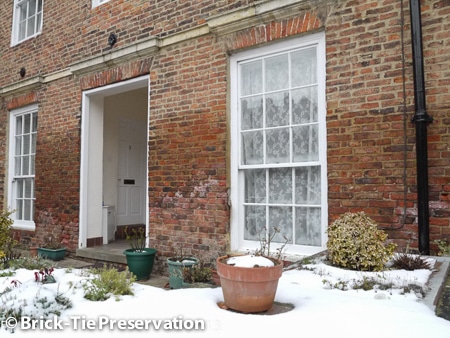Where Chemical damp proofing is concerned – getting the diagnosis right is a must, so that the correct treatment can be applied.
We get asked to look at damp problems in and around Yorkshire on a daily basis and in the majority of cases we do not recommend a chemical damp proof course (DPC) is installed. The reason is because there are lots of damp problems which are due to causes which a DPC will not have any effect on.
These include damp caused by water driving through a wall (penetrating damp), in effect rainwater and often the cause is just poor pointing, cracked render or leaking gutters ? these can all be easily fixed and if damp is due to one of these, our survey will identify this, no chemical damp-proofing needed.
Another common cause of damp is condensation, usually resulting in mould growth on wallpaper and ceilings. A DPC will not cure this problem, though on surveys we will always make recommendation on what will.
Rising damp is moisture being ‘pulled’ up into walls from the ground; think of a wick in oil or paraffin. All walls are porous to some extent and they are built with their feet in the ground. When the ground gets saturated (every time it rains), rising damp is a possibility, in walls which lack an effective DPC.
Rising damp can cause: damage to structural timbers like floor joists and wall plates; peeling wallpaper and salting plaster; decaying skirting boards and door frames.
This is the only damp scenario where damp-proofing, using chemical injection can help and is worth the expence.
There are many methods and products to do this and like all things, some are better than others. They all work on the same principle though; coating the internal pores of a wall with a water repellent so that the ‘wicking’ action, which we know as capillary action, is discouraged.
Installation is just getting sufficient of the water repellent into the base of the wall, be it 100mm thick or 500mm thick. In the past this was injected under pressure, though nowadays chemical diffusion, via a specially formulated ‘cream’ is most popular.
The effectiveness of the cream depends on how it is formulated; the active ingredients and of course where it is introduced; the right diameter holes, drilled the right distance apart and to the correct depth, at the right height. This is what needs thinking about when installing a chemical DPC.
Not rocket science at all, but still requiring good knowledge and above all diligence and care, if the system is to work well.
The way we address this is by making sure we identify the best performing DPC cream and making sure our damp-proofing technicians are well trained, qualified and engaged in delivering your damp-proofing system properly.
Thus we use Safeguard Europe’s DryZone DPC cream, which is the most rigorously tested product on the market, having undergone extensive testing and analysis by leading test labs and Universities in the UK and Europe.
Our technician’s regularly attend Property Care Association technician training and all hold the PCA’s technician certificate, proving they know how to do this essential damp-proofing work. They also hold the City & Guilds NVQ level 2 in damp-proofing and timber treatment. Meet our team here
On-going training with regular refresher talks and good supervision make sure we deliver the best damp-proofing in Yorkshire.
Customer peace of mind comes from the knowledge that we’ve made every effort to get the diagnosis and the treatment right. Then of course there’s a 20 year damp-proofing guarantee, with industry leading insurance via the Guarantee Protection Insurance Company.
Correct damp diagnosis by our local, highly qualified damp surveyors is available across Yorkshire, including, Leeds, Bradford, Sheffield, Huddersfield, Harrogate, Wetherby, Wakefield and York
Why not take a look at the damp diagnosis videos via our media pages?

